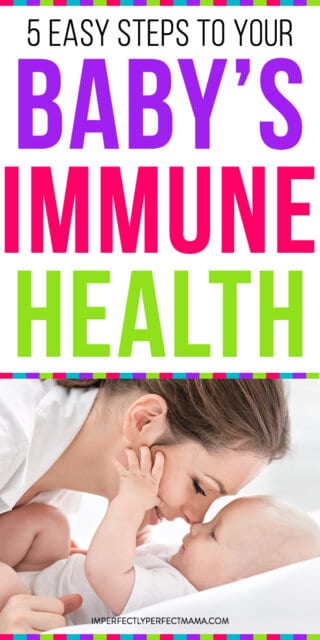Immune health is so important for a growing body.

Not only does our immune system help fight off germs today, but it is also involved in protecting us from developing conditions such as asthma, allergies, eczema, and Type 1 Diabetes later in life.
Research now shows that the first 6 months of life are an important window of time when the immune system is rapidly developing, and the type of bacteria in a baby’s gut influence how this process happens.
If there are too many bad bacteria in baby’s gut early in life, immune system development is disrupted, leading to greater risk of developing illnesses, infections, eczema, allergies, and autoimmune conditions later in life.
Luckily, we now have a better understanding of how the immune system develops and works, and a big part of this has to do with the types of bacteria that live in the gut.
Unfortunately, research has shown that babies born today are more likely than ever to have a dysbiotic gut, meaning they don’t have the good bacteria that their bodies need to properly program the immune system and they have high levels of bad gut bacteria.
Studies have also identified that some of these bad bacteria are linked to intestinal inflammation which can increase the risk of eczema and allergies as baby gets older.
Here are my go-to tips to ensure a strong and healthy foundation for immune health:
1. If Possible, Breastfeed
Breast milk and breastfeeding has many benefits for baby, providing all nutrients baby needs for early growth and development. Additionally, moms can transfer antibodies to baby through breast milk, helping to protect baby while their immune system is developing.
2. Use Specific Probiotic Bacteria to Boost Immunity
Since babies today are often shown to have fewer good gut bacteria and a high abundance of bad gut bacteria during the early period of immune development, it’s critical for development of the immune system to restore the good gut bacteria. B. infantis, is the specific type of beneficial bacteria for infants that is known to program the immune system properly.
I recommend Evivo, a baby probiotic with B. infantis, which is clinically proven to reduce bad gut bacteria by 80 percent.
3. Don’t Shy Away From Dirt and Mess
There’s a common misconception that everything should be as sterile as possible to keep a baby healthy, but encountering some types of dirt, germs, and bacteria can actually be beneficial for a baby’s developing immune system.
Once kids are old enough, let them play outside in the dirt and don’t be afraid of letting baby come in contact with your pets as kids who play outside and grow up with pets also have fewer allergies.
4. Schedule Plenty of Naps
Sleep is notoriously hard to come by for parents of newborns, and babies themselves, but making sure that a baby is getting plenty of sleep is important for growth, development, and a healthy immune system, especially as they grow older.
Sleep is essential for people of all ages, so joining your child for nap time isn’t a bad idea.
5. Don’t Pressure Your Pediatrician for Antibiotics
When your baby is sick, many parents’ first instinct is to get medicine such as antibiotics to treat their child’s infection.
Antibiotics aren’t always the best solution though, especially since most infections young kids get are caused by viruses, not bacteria.
Sometimes your pediatrician may recommend a wait and see approach for some types of infections (eg. ear infections), which allows a baby’s immune system to fight off an infection without medical intervention and then if not improving, or worsening, to start treatment.
Encouraging proper immune health for your baby can sound daunting but following these suggestions will help you ensure that your baby’s immune system develops properly to help set your little one up for a life of good health!




Leave a Reply